The week’s best movies in L.A.: Shelley Duvall, ‘La Bamba’ in 4K and more

- Share via
Hello! I’m Mark Olsen. Welcome to another edition of your regular field guide to a world of Only Good Movies.
Gena Rowlands died Wednesday at age 94, following her family’s announcement earlier this year that she was suffering from Alzheimer’s disease. To simply call Rowlands an actor doesn’t quite communicate the impact of her career. The movies she collaborated on with husband John Cassavetes helped pave the way for independent film as we know it today, both in the way they were made and distributed and in the fight for creative freedom they represented.
In films such as “Faces, “A Woman Under the Influence,” “Minnie and Moskowitz,” “Gloria,” “Opening Night,” “Love Streams” and many others (including, yes, “The Notebook,” directed by her son Nick Cassavetes), Rowlands’ performances had a soulful power that combined a sense of naturalism with a bracing, adventurous theatricality. Simply put, her characters seemed alive in ways that one rarely sees onscreen.

Rowlands was a two-time Oscar nominee and three-time Primetime Emmy winner. Accepting an honorary Academy Award in 2015, Rowlands said, “What’s great about being an actress is you don’t just live one life, you live many lives. You are not just stuck with yourself all of your life.”
The outpouring of affection online for Rowlands was immediate, speaking to the esteem and reverence with which she was held by generations of actors, including Laura Dern, Aubrey Plaza, Kirsten Dunst, Rebecca Hall, Chloë Sevigny and Taylour Paige, along with filmmakers including Jim Jarmusch, who directed Rowlands in “Night on Earth,” Allison Anders, Sofia Coppola and Justine Triet.
Shelley Duvall’s certain something
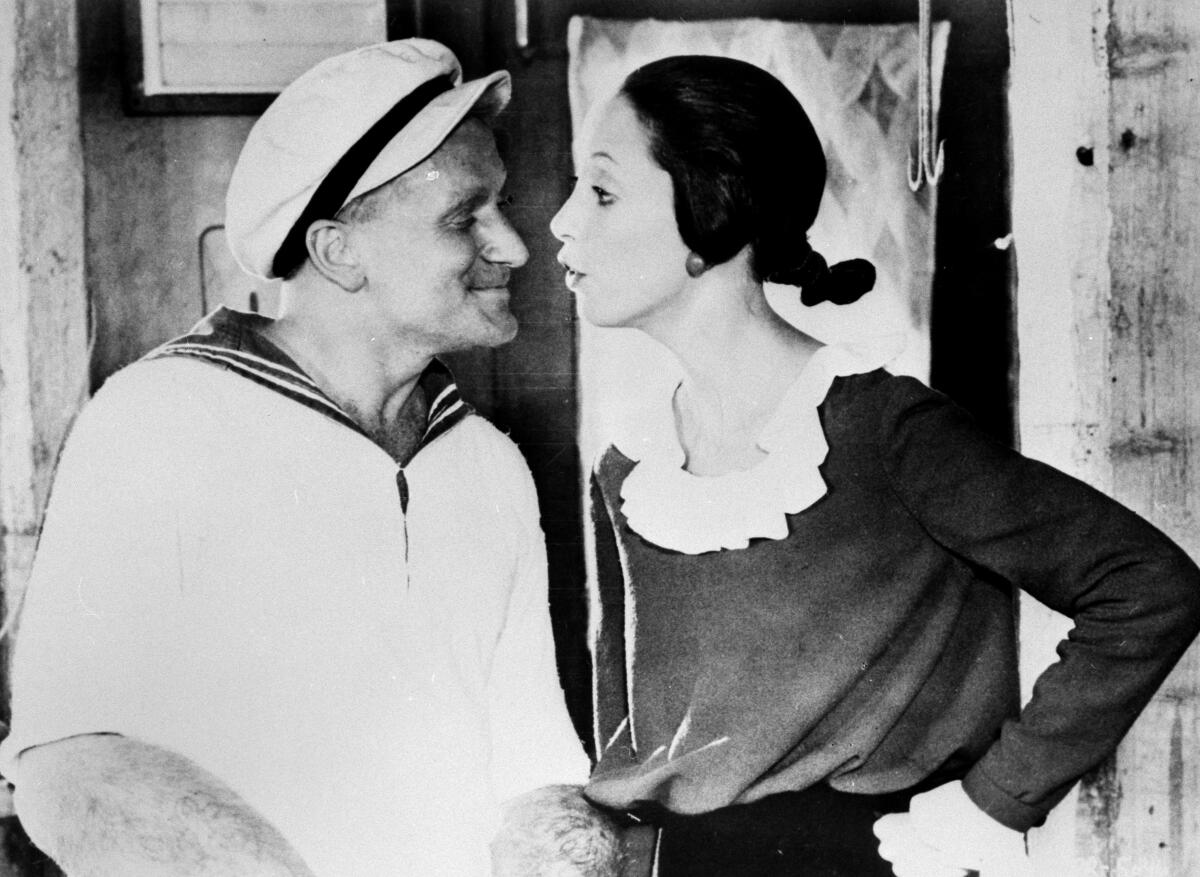
The American Cinematheque has launched a tribute series to actor Shelley Duvall, who died in July at age 75 but whose unique screen presence lives on. The series will underscore Duvall’s ongoing collaboration with filmmaker Robert Altman, who discovered Duvall before casting her in her debut in 1970’s “Brewster McCloud.” The series began with Altman’s 1974 “Thieves Like Us” and will also include 1975’s “Nashville,” 1977’s “3 Women,” for which Duvall won best actress at the Cannes Film Festival, and 1980’s “Popeye.”
In his Times review of “Brewster McCloud,” Charles Champlin described Duvall as “an ingenuously funny wide-eyed big-toothed enjoyment.”
Of “Popeye,” Champlin wrote, “Its difficulties arise not from a lack of ambition but from excesses of them. The result is a film that is rarely uninteresting but seldom entirely satisfying, except when young Wesley [Ivan Hunt as Swee’pea] is beaming his radiant innocence or when Shelley Duvall is being Olive Oyl to absolute high-voiced perfection.” Elsewhere, Champlin added, “Highest praise to Shelley Duvall for her deliciously addled, uncoordinated, petulant but finally quite endearing Olive Oyl. She is exactly the transition from newsprint to film that the whole picture had in mind.”

At the time of a May 1979 Times profile, Duvall had been announced for the role in “Popeye” but filming had not yet begun — amid rumors that the part might be taken over by Gilda Radner or Lily Tomlin. Writer Roderick Mann declared Duvall “the actress with the Modigliani face and the thermometer figure” as she sat for an interview in a hotel suite on the Sunset Strip. Of the gossip regarding the casting of the role, Duvall said, “It is awkward. People ask me about it wherever I go, but as far as I know everything’s fine. I’ve got the part, Robert Altman called me when I was in London and said, ‘Shell, I’ve got the role you were born to play. Guess what it is?’ I couldn’t guess, but when he told me, I was thrilled.” Elsewhere she added, “All I know is the producer, the director and the writer want me for the part, so I must assume all is well.”
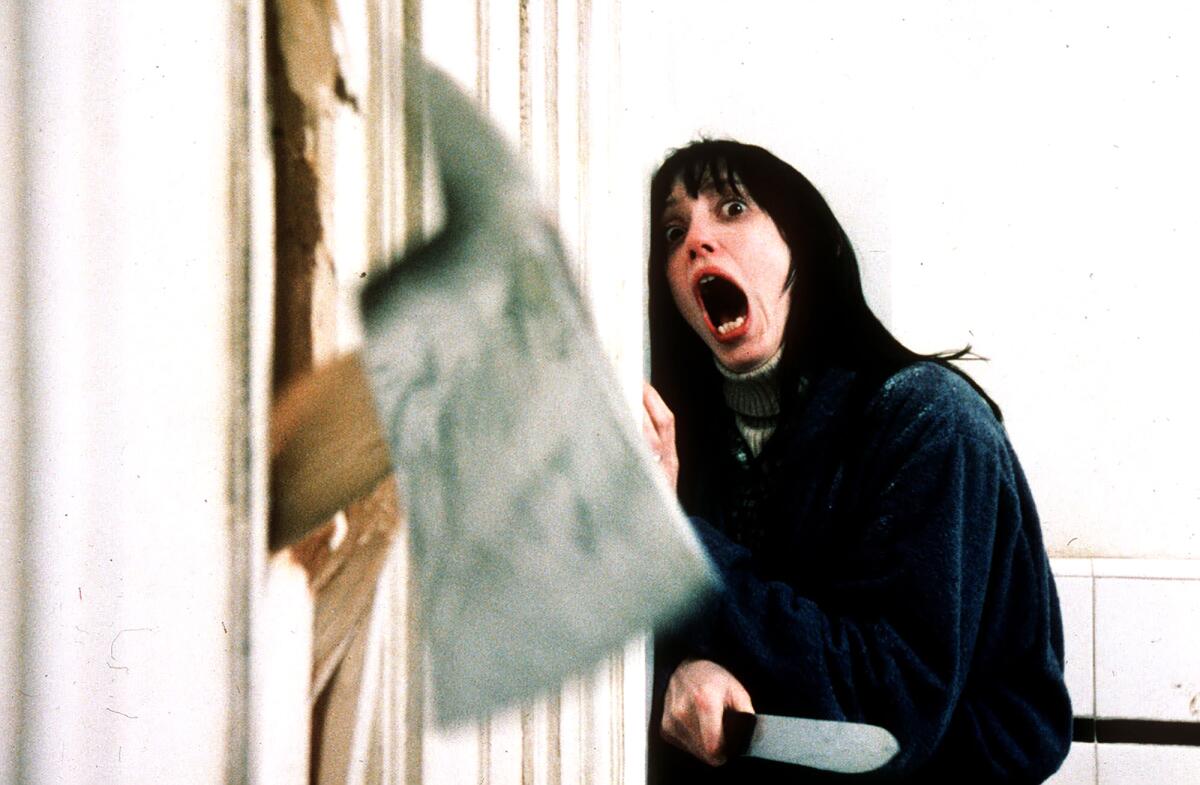
The Cinematheque series also includes Terry Gilliam’s 1981 “Time Bandits” and Stanley Kubrick’s 1980 “The Shining.” The Kubrick film in particular has become a contentious part of Duvall’s legacy, as some fans have come to feel the extreme conditions of the shoot were borderline abusive.
Duvall herself cheerfully said in her 1979 Times interview, after shooting had finished on “The Shining,” that “I don’t think any actress in the history of this business has had to cry as much as I did,” before adding, “And you know something? It was such a marvelous release. Great therapy. After spending all day crying, I’d feel just wonderful in the evening.”
‘La Bamba’ in 4K at the Academy
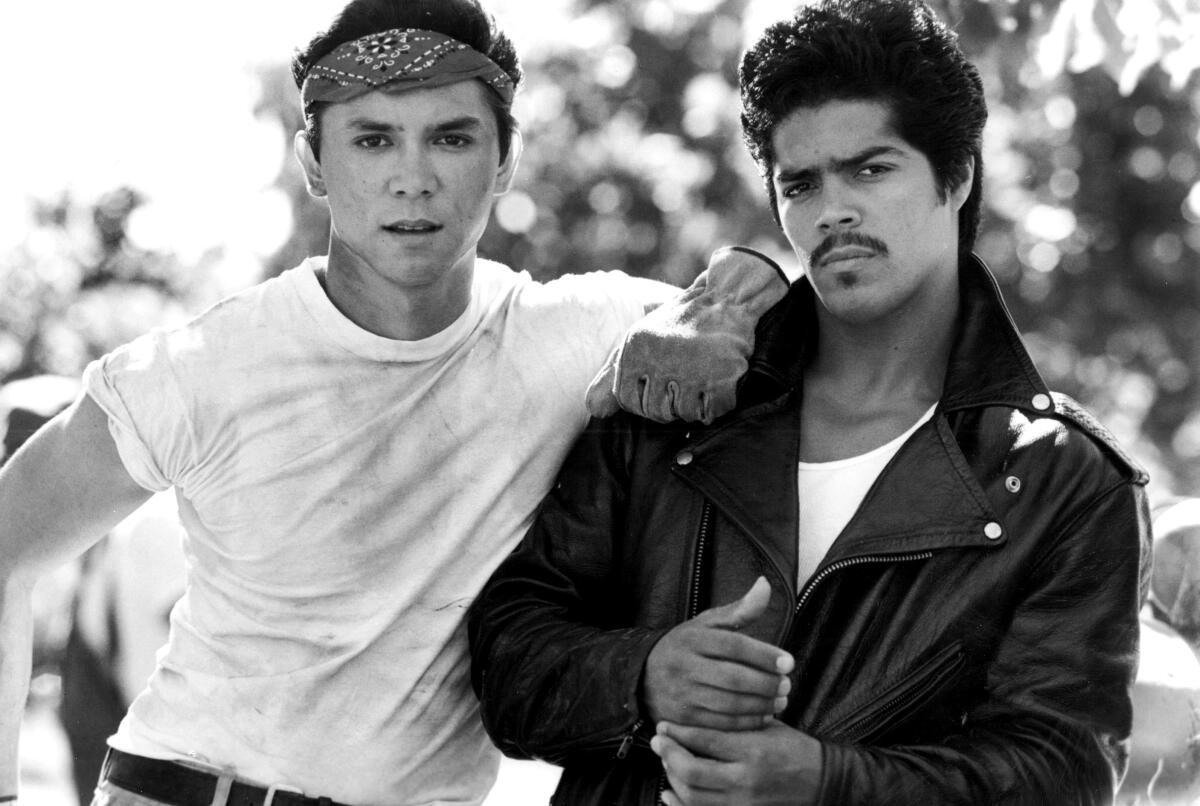
As a follow-up to his ambitious debut “Zoot Suit,” writer-director Luis Valdez made 1987’s “La Bamba,” a biopic of early rock-’n’-roller Richie Valens, who had three chart-topping hits in eight months and died at just 17 in a plane crash that also took the lives of Buddy Holly and J.P. “The Big Bopper” Richardson.
The Academy Museum will screen “La Bamba” in 4K on Saturday with star Lou Diamond Phillips, who plays Valens, scheduled to appear along with actor and musical director Daniel Valdez and actor and producer Esai Morales for a conversation moderated by Patty Rodriguez.
Besides telling Valens’ story — his last name was changed from Valenzuela — the film is also a portrait of Chicano life in Southern California in the 1950s. Valens’ music is re-created by L.A.’s own Los Lobos, who had a No. 1 hit with a remake of Valens’ signature song, “La Bamba.”
In her original Times review, Sheila Benson noted that Valdez “has flooded his movie with the driving, irresistible music of Los Lobos, he has reached deep into personal memory for authentic details of migrant worker camps and cracker-box San Fernando Valley houses, and in Lou Diamond Phillips he has found an exceptional young unknown to play Valens. With all these strengths, the wonder is that the movie isn’t full of raw energy, that it’s for the most part polite melodrama … You can have a perfectly pleasant time at ‘La Bamba,’ but you come out still hungry to understand the forces that shaped him.”
Points of interest
‘Universal Soldier: Day of Reckoning’

On Wednesday, as part of the series “Killer Movies With Josh Miller,” the American Cinematheque will show John Hyams’ 2012 “Universal Solder: Day of Reckoning.” A gritty, brutal action picture with appearances from series regulars Jean-Claude Van Damme and Dolph Lundgren, the story involves a man (Scott Adkins) looking to avenge his slain family, along the way uncovering a government program of genetically modified soldiers.
Via email, Miller said that while the series skews toward horror and action, “the unifying idea is they’re all movies that ‘kill’ with a crowd. The kind of movies that you’d save to watch with a big group of friends because you know it will be more fun. Movies that have that certain je ne sais quoi that almost seems to feed off the audience reaction. And I particularly love reevaluating movies that got a bum rap when they first came out, that I think should be considered a genre classic moving forward.”
Miller noted that “Day of Reckoning” was one of the titles he had in mind when he first thought of the series. The film had a nominal release when it first came out, so most people have only seen it on home video. As Miller put it, “Most people who watched it, probably watched it alone and had no idea what to make of it. It is such a wild film, a blood-soaked thrill ride with art-house aesthetics. A lot of film nerds found it and loved it, yet you rarely see it talked about with other great action films of the past 15 years. And it should be. John Hyams’ skill with directing action is so inventive and effortless. It practically sizzles off the screen. So I am hoping to expose it to some fresh and ready eyeballs.”
I reviewed the movie when it originally opened, lauding an extended fight scene in a sporting goods store that must be seen to be believed, while noting, “Just through general downer mojo and heavy use of some serious strobe effects, the movie creates something of the sensation of huffing industrial solvents — in a good way! — a waking-sleep zombification that can’t exactly be described as pleasurable but definitely has an odd, distinct power.”
‘Watermelon Man’ and ‘Putney Swope’
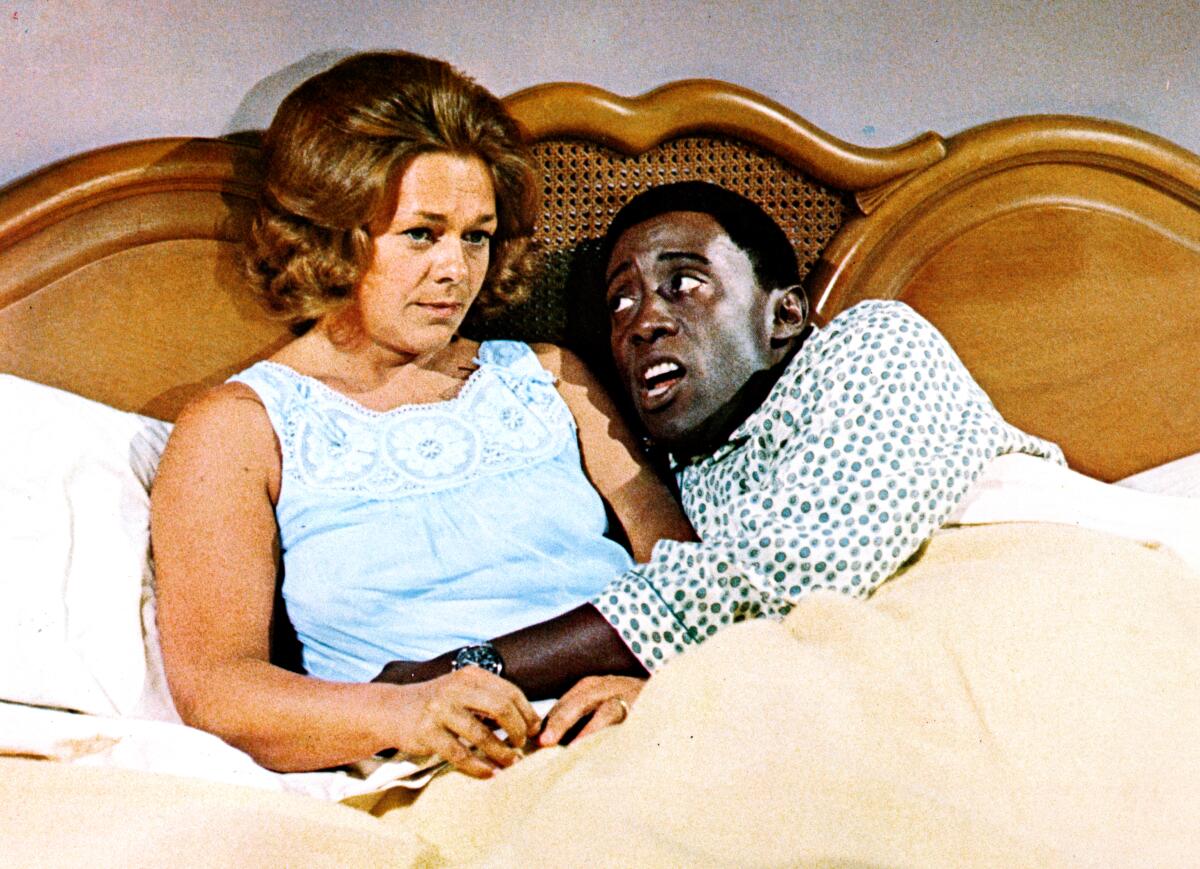
On Wednesday and Thursday, the New Beverly will have a double bill of Melvin Van Peebles’ 1970 “Watermelon Man” and Robert Downey Sr.’s 1969 “Putney Swope.” Both films are scathing satires of America’s attitudes towards race at the time, and both remain timely, outrageous and funny today.
In “Watermelon Man,” Godfrey Cambridge plays a racist white man who wakes up one day to discover that he is now Black. As Kevin Thomas put it in his original Times review, “The things that could be predicted to happen to Cambridge happen — his neighbors want him to move because they believe he’s a threat to property values, his wife proves not to be the liberal she claimed to be, his boss, once past the initial shock, sees in his newly Black salesman a chance to exploit a whole new marketplace. But surely there’s lots more for a white man to discover about what it’s like to be Black in America than this.”
“Putney Swope” stars Arnold Johnson as the only Black executive at an advertising firm, where he is accidentally put in charge. He renames the company Truth and Soul, Inc. and turns the business on its head, bringing actual truth to advertising.
In his original Times review of the film, Champlin wrote, “‘Putney Swope’ is not for anyone who demands good taste in movies, or restraint, or a presumption of dignity in the human character. But in its youthful, irreverent, and uninhibited by medicinal way, ‘Putney Swope’ is shocking good fun.”
Also in the news
‘Alien: Romulus’
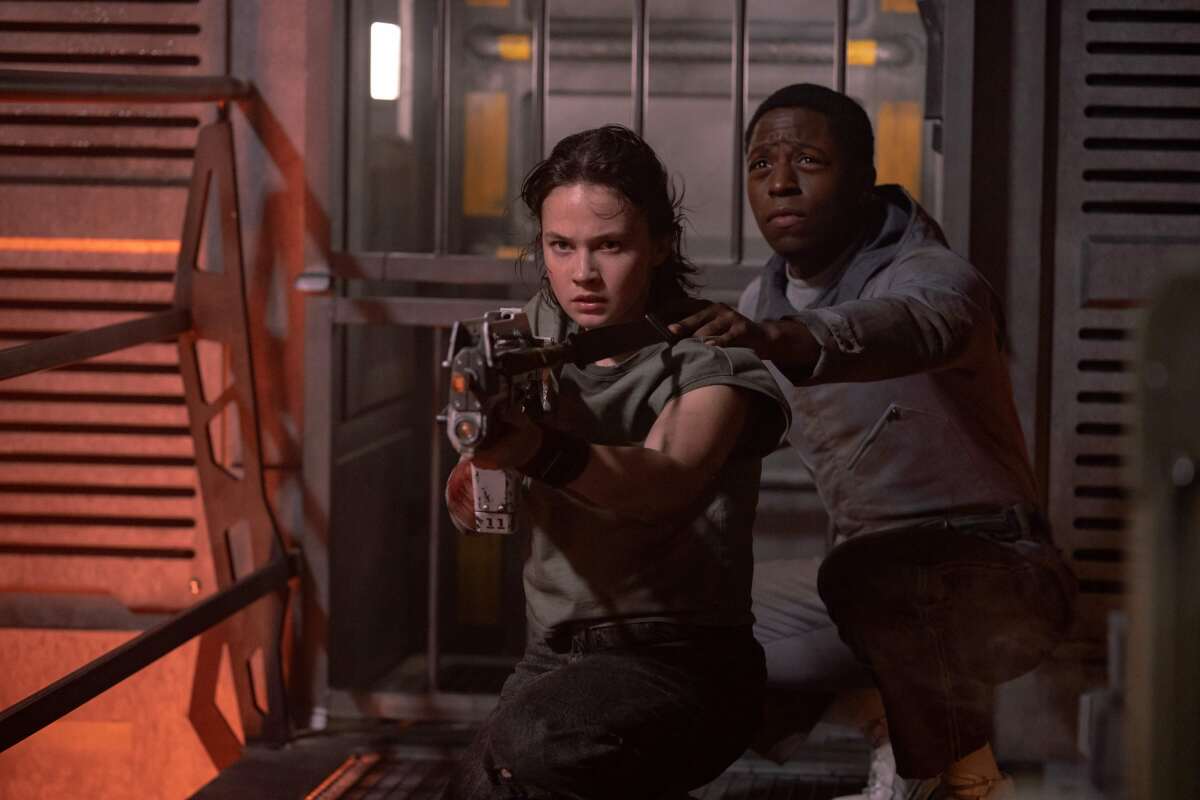
The latest iteration of the “Alien” franchise, “Alien: Romulus” hits theaters this weekend. Directed and co-written by Fede Alvarez, the film stars Cailee Spaeny, David Jonsson and Archie Renaux.
In a review for The Times, Katie Walsh noted that the franchise had always made space for the individual aesthetics and preoccupations of its directors, from Ridley Scott and James Cameron to David Fincher and Jean-Pierre Jeunet. As she wrote, “With ‘Evil Dead’ and ‘Don’t Breathe’ director Fede Alvarez now at the helm of ‘Alien: Romulus,’ it’s no surprise that his version is a contained slasher flick drenched in goopy viscera, in which a group of scrappy youths are hunted down by an unknowable monster. Co-written by Alvarez and Rodo Sayagués, the screenplay for ‘Alien: Romulus’ is ruthlessly efficient while touching down on recognizable themes from the series: pregnancy, female strength and the clash between human and artificial intelligence.”
Walsh added, “One could argue that ‘Alien’ movies are like pizza — they’re good even when they’re not so great — and aside from a few head-scratching choices that will no doubt inspire reams of think pieces, ‘Alien: Romulus,’ with its thrilling tactility and appealingly plucky cast, is a very enjoyable pie.”
Carlos Aguilar interviewed Alvarez, who described what it was like collaborating with Scott as a producer on the film. Though Alvarez had previously collaborated with filmmaker Sam Raimi, something about Scott was different.
“I became a nervous little kid knowing I was going to have the opportunity to have an audience with the great Ridley Scott, and the times I’ve met with him since it always feels the same,” Alvarez said. “It’s like having the chance to visit the Oracle of Delphi.”
Only good movies
Get the Indie Focus newsletter, Mark Olsen's weekly guide to the world of cinema.
You may occasionally receive promotional content from the Los Angeles Times.




